| Srl | Item |
| 1 |
ID:
117881
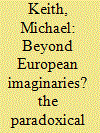

|
|
|
|
|
| Publication |
2013.
|
| Summary/Abstract |
This article suggests that a politics of difference demands a recognition of a paradox of universal welfare and a paradox of pirate modernities. The former rests on the fiscal cartography of institutional governance. The latter rests on a reframing of the notion of arrival in an age of globalisation. Both would benefit from an analytical blurring of perspectives that privilege the everyday world of cities of the Global South and those of the Global North.
|
|
|
|
|
|
|
|
|
|
|
|
|
|
|
|
| 2 |
ID:
169030
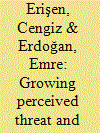

|
|
|
|
|
| Summary/Abstract |
Tolerance is a central concept for a society’s democratic foundations. Many forms of populism threaten tolerance and are a growing concern for consolidated liberal democracies as well developing ones. Right-wing ideology, heightened nationalism, and xenophobic rhetoric toward minorities are threatening social cohesion, public unity, and liberal values. Turkey, subject to various destabilizing recent events, faces specific challenges amid political, social, and economic uncertainties. Using two waves of a nationally representative survey, conducted after each of two general elections in 2015, we studied changes in the behavioral indicators of intolerance in the Turkish electorate. We found that perceived threat and prejudice explain changes in public intolerance during this period. We discuss the implications of our results for the standing of democracy in Turkey.
|
|
|
|
|
|
|
|
|
|
|
|
|
|
|
|
| 3 |
ID:
140429
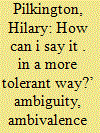

|
|
|
|
|
| Summary/Abstract |
Although survey data identify no significant predictor of intolerance among the Russian population, young people are considered to display heightened levels of ethnic intolerance and radical variants of xenophobia. Drawing on survey and semi-structured interview data from a study of patriotism among young people in two cities in the North-West region of Russia, this article explores the strength of ethnic self-identification and ethnically exclusive notions of Russianness and compares levels and forms of ethnic intolerance. Identifying that routine expression of xenophobic sentiments coexists alongside a commitment to principles of ethnic equality, the article considers what the ambiguities and contradictions in the articulation of intolerance tell us about how young people negotiate complex contemporary multicultural societies.
|
|
|
|
|
|
|
|
|
|
|
|
|
|
|
|
| 4 |
ID:
160407
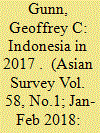

|
|
|
|
|
| Summary/Abstract |
In mass demonstrations spearheaded by a coalition of Islamic radicals, 2017 witnessed a polarizing assault on the nation’s broadly secular founding creed, Pancasila. With the arrest and imprisonment of the popular ethnic-Chinese Christian mayor of Jakarta on spurious blasphemy charges, even the Indonesian president was left on the back foot and obliged to push back.
|
|
|
|
|
|
|
|
|
|
|
|
|
|
|
|
| 5 |
ID:
151161
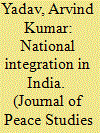

|
|
|
| 6 |
ID:
183685
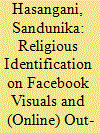

|
|
|
|
|
| Summary/Abstract |
Following several online and offline ethno-religious tensions in 2018 and 2019, social media (Facebook in particular) has become one of the scapegoats for instigating ethnic intolerance in Sri Lanka. Conjecture suggests that increased religious commitment and frequently shared religious expressions on social media are responsible for provoking ethnic intolerance. Against that backdrop, the present study investigates to what extent Facebook graphics expressing out-group intolerance are associated with in-group religious identification by analysing a sample of graphics posted on Facebook by a Sinhala-Buddhist community from 2011 to 2018. The findings reject the religious rationale and reveal that increased in-group religious identification does not necessarily characterize ethnically intolerant visual content on Facebook. Instead, online ethnic intolerance can be better attributed to threat perceptions and conspiracy theories.
|
|
|
|
|
|
|
|
|
|
|
|
|
|
|
|
| 7 |
ID:
154621
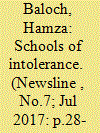

|
|
|
| 8 |
ID:
157614
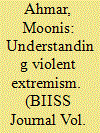

|
|
|
|
|
| Summary/Abstract |
In South Asia, contemporary Pakistan is one of the most affected countries as far
as terrorism and violent extremism are concerned. Although, the phenomenon
is not new in Pakistan, the country, however, witnessed a gradual resurgence of
violence and extremism during the last three decades. This paper examines the
phenomenon of violent extremism by linking it with the radicalisation of youths
in Pakistan. It dwells at length the permeation of extremism in various segments
of Pakistani society in the post-1971 Pakistan; the role of state in not reversing
the tide of religious extremism which got an impetus because of the Afghan
War and the events occurring in post- 9/11 period. Why the culture of tolerance
witnessed erosion in the last four decades and how ethics and values declined
particularly among the new generation of Pakistan are also be examined in
the paper. More so, the transformation of extremism from moderate to radical
and violent are also examined while focusing on the erosion of the culture of
tolerance and the permeation of violence at societal level. A road map dealing
with the predicament of youths in Pakistan by eradicating extremism is also
discussed and plausible solutions of growing radicalisation of youths of this
country are delineated in this paper. It is argued that meaningful steps need to be
undertaken by the people at the helm of affairs to ensure positive transformation
in the approach, attitude and behaviour of youths to prevent them from falling
into the trap of intolerance, extremism and violence. And such steps include not
only social, economic and governance reforms but also must include extensive
reforms of the education sector as well.
|
|
|
|
|
|
|
|
|
|
|
|
|
|
|
|